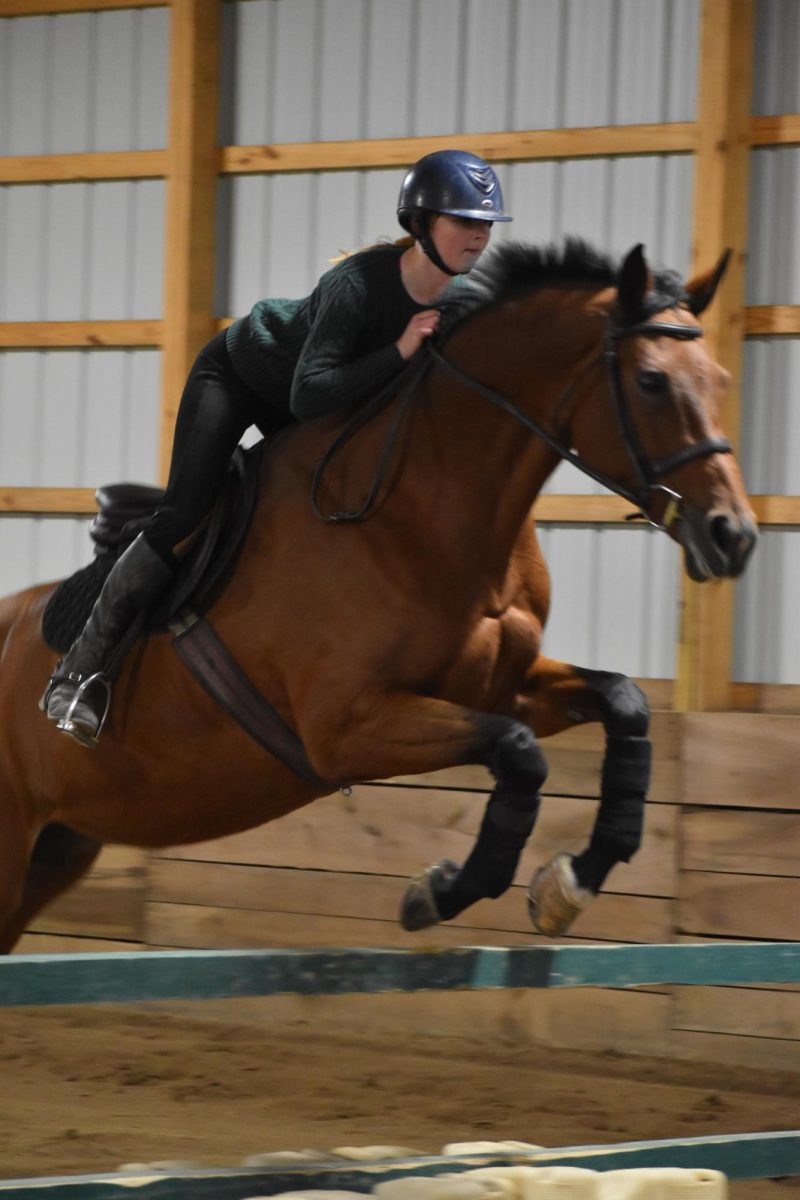By: John Shi <[email protected]>
Sophomores David Edgerly and Ryan Duffy had no idea they had a counterfeit $5 bill in their Care to Share money.
But when French teacher Andrea Yocum, also Edgerly and Duffy’s SRT teacher, came across the strangely proportioned bill, she said she immediately realized that the bill looked and felt wrong.
Edgerly said Yocum then took both him and Duffy into the hall.
“She said to us, ‘Does this look real to you?’” Duffy said.
“The bill was wrinkled to make it seem like it was real,” Edgerly said. “And it was pretty impressive.”
Duffy agreed. “Yeah, it definitely seems like they spent some time on it,” he said.
Duffy and Edgerly had been duped into accepting a counterfeit bill.
“We didn’t suspect it at the time,” Duffy said. After removing the bill from the Care to Share funds, Yocum said she reported the incident to Administrative Assistant Doug Bird, who declined to comment, citing privacy issues.
But according to Officer Gene Stilts, this incident would not be the first in this school’s history.
“I don’t have any specifics, but we’ve had a couple of students before who have even used the school printers for counterfeiting,” he said.
Stilts said that although he is not familiar with the current investigation in which Duffy and Edgerly’s discovery plays a part, students in the past have ended up in serious trouble after being tracked down by a combination of school officials, the police department and the U. S. Secret Service.
“I don’t know the exact dispositions of the incidents,” Stilts said. “But I know for a fact that kids were caught who were involved with counterfeiting before.”
In one previous case of counterfeiting, Stilts said that the Secret Service even came to the offending student’s residence and confiscated that student’s family computer and printer.
Stilts said, “You need to understand the seriousness of (counterfeiting).”
According to the U. S. Secret Service, manufacturing counterfeit U. S. currency is punishable by a fine or imprisonment for up to 15 years.
And Stilts said that with modern technology aiding school officials and police, investigations almost always lead to the culprit being caught.
“Students should know that committing a crime using computers leaves digital footprints,” he said. “For example, (investigators) can search from printers because chips in printers have time stamps and then coordinate log-on times. And forensic searches of (personal computers) easily reveal files students may have thought they had deleted.”
Even so, according to the Secret Service, the average citizen has a responsibility to pay attention to their bills. Their Web site stated the following: “Look at the money you receive. Compare a suspect note with a genuine note of the same denomination and series.”
And that’s what Edgerly and Duffy did.
“After we compared it (to a real $5 bill), it was really obvious,” Edgerly said. “It looked shorter (than a real bill), felt stiff and the coloring was off.”
According to Stilts, people need to a little more thorough in examining their bills to prevent fakes from passing. “I can see how some of them are not caught at first glance,” he said. “But most are obvious upon closer inspection.”
However, Stilts said that students really need to just be aware of the consequences of counterfeiting. He also said that though most students are not out to make thousands of dollars in a counterfeiting operation, they fail to see that faking a $5 or a $10 for lunch money also carries serious penalties under the law—it’s still a felony.
“Students are misunderstanding the implications of their actions.The risks are not worth it. The most unfortunate mistake is when (students) do not see the consequences of their actions,” he said.
“They’re not criminals,” Stilts said. “In most cases, they just do not realize what they do can get them into big trouble.”































![British royalty are American celebrities [opinion]](https://hilite.org/wp-content/uploads/2024/03/Screenshot-2024-03-24-1.44.57-PM.png)




















![Review: Quiet on Set: The Dark Side of Kids TV is the long awaited exposé of pedophilia within the children’s entertainment industry [MUSE]](https://hilite.org/wp-content/uploads/2024/04/unnamed.jpg)
![Review: “The Iron Claw” cannot get enough praise [MUSE]](https://hilite.org/wp-content/uploads/2024/04/unnamed.png)
![Review: “The Bear” sets an unbelievably high bar for future comedy shows [MUSE]](https://hilite.org/wp-content/uploads/2024/03/unnamed.png)
![Review: “Mysterious Lotus Casebook” is an amazing historical Chinese drama [MUSE]](https://hilite.org/wp-content/uploads/2024/03/0.webp)
![Thea Bendaly on her Instagram-run crochet shop [Biz Buzz]](https://hilite.org/wp-content/uploads/2024/03/IMG_0165-1200x838.jpg)
![Review in Print: Maripaz Villar brings a delightfully unique style to the world of WEBTOON [MUSE]](https://hilite.org/wp-content/uploads/2023/12/maripazcover-1200x960.jpg)
![Review: “The Sword of Kaigen” is a masterpiece [MUSE]](https://hilite.org/wp-content/uploads/2023/11/Screenshot-2023-11-26-201051.png)
![Review: Gateron Oil Kings, great linear switches, okay price [MUSE]](https://hilite.org/wp-content/uploads/2023/11/Screenshot-2023-11-26-200553.png)
![Review: “A Haunting in Venice” is a significant improvement from other Agatha Christie adaptations [MUSE]](https://hilite.org/wp-content/uploads/2023/11/e7ee2938a6d422669771bce6d8088521.jpg)
![Review: A Thanksgiving story from elementary school, still just as interesting [MUSE]](https://hilite.org/wp-content/uploads/2023/11/Screenshot-2023-11-26-195514-987x1200.png)
![Review: When I Fly Towards You, cute, uplifting youth drama [MUSE]](https://hilite.org/wp-content/uploads/2023/09/When-I-Fly-Towards-You-Chinese-drama.png)
![Postcards from Muse: Hawaii Travel Diary [MUSE]](https://hilite.org/wp-content/uploads/2023/09/My-project-1-1200x1200.jpg)
![Review: Ladybug & Cat Noir: The Movie, departure from original show [MUSE]](https://hilite.org/wp-content/uploads/2023/09/Ladybug__Cat_Noir_-_The_Movie_poster.jpg)
![Review in Print: Hidden Love is the cute, uplifting drama everyone needs [MUSE]](https://hilite.org/wp-content/uploads/2023/09/hiddenlovecover-e1693597208225-1030x1200.png)
![Review in Print: Heartstopper is the heartwarming queer romance we all need [MUSE]](https://hilite.org/wp-content/uploads/2023/08/museheartstoppercover-1200x654.png)























![Review: Ladybug & Cat Noir: The Movie, departure from original show [MUSE]](https://hilite.org/wp-content/uploads/2023/09/Ladybug__Cat_Noir_-_The_Movie_poster-221x300.jpg)

![Review: Next in Fashion season two survives changes, becomes a valuable pop culture artifact [MUSE]](https://hilite.org/wp-content/uploads/2023/03/Screen-Shot-2023-03-09-at-11.05.05-AM-300x214.png)
![Review: Is The Stormlight Archive worth it? [MUSE]](https://hilite.org/wp-content/uploads/2023/10/unnamed-1-184x300.png)


Raj Khatri • Oct 7, 2008 at 4:33 am
Yes right counterfeit currency is very common now a days several machine are also introduce who can identify the counterfeit currency, i have purchased from http://www.catchfrauds.com